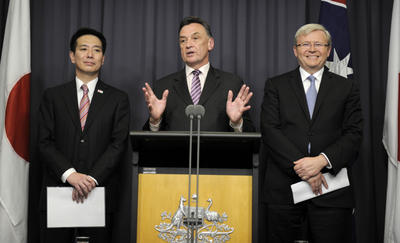That is very welcome. However, he also stated his support for FTAs ‘that contribute to multilateralism’. This FTA ‘health test’ is an oxymoron – like saying ‘prison’s great provided freedom’s kept.’ Treasury’s ‘Red Book’ recognised this, highlighting the Productivity Commission’s warning that the Department of Foreign Affairs and Trade (DFAT) has oversold the economic benefits of FTAs and largely ignored the negatives, noting they ‘are not meeting Australia’s needs’, ‘their proliferation has not built support for multilateral liberalisation’, and has been ‘reducing policy reform flexibility.’
Healing Australian trade policy is a formidable challenge for Emerson. DFAT is still wedded to FTAs, as can be seen in its deceitful and self-serving defence of its record in its latest submission to the PC’s Study on Trade Agreements – lodged a month after Emerson became minister.
The government has just re-committed to an FTA with Pacific islands, and to completing the FTA with Malaysia by 2011. In no way would these pass Emerson’s FTA test.
Worse, Emerson has suggested that the proposed Trans-Pacific Partnership (TPP) could morph into an FTA for Asia and the Pacific. How could this be consistent with APEC’s non-discriminatory Bogor goals of free and open trade and investment? Admittedly, APEC needs revitalising. But in the words of ANU’s Professor Drysdale, what APEC needs is a ‘grand-slam forward-looking agenda, and Australia should not slavishly and naively go along with pursuing an old-fashioned US-style series of FTAs.
Emerson needs to quickly administer the economic medicine. Ordering a moratorium on new FTAs and cleaning up the mess being made by existing ones would be a good start.
Malcolm Bosworth is a visiting economist at ANU Enterprise.


It seems that the current government is also using the Howard govt strategy of expanding the negotiating basket to include strategic coins. This was demonstrated by the statement that Australia would be a secure, stable and reliable long term supplier of rare earths to Japan at the same time as FTA talks were relaunched.
Korea is now looking to include strategic raw material supply in the Korea-Australia FTA. Conflating trade and security is not always wise.
Malcolm Bosworth’s critical review of Australia’s FTA policy is right on target. FTAs have been the bane of US trade policy ever since they were sold to the US Government as a ‘better method’ by a former USTR. They have interfered with and/or slowed down progress towards completing the Doha WTO round and despite government hype to the contrary they have not met their goal of ‘expanding’ US trade.
The question is however whether the many drawbacks of the FTA approach can become sufficiently understood in order to prevent even more from taking root.
I am hopeful but not sanguine.